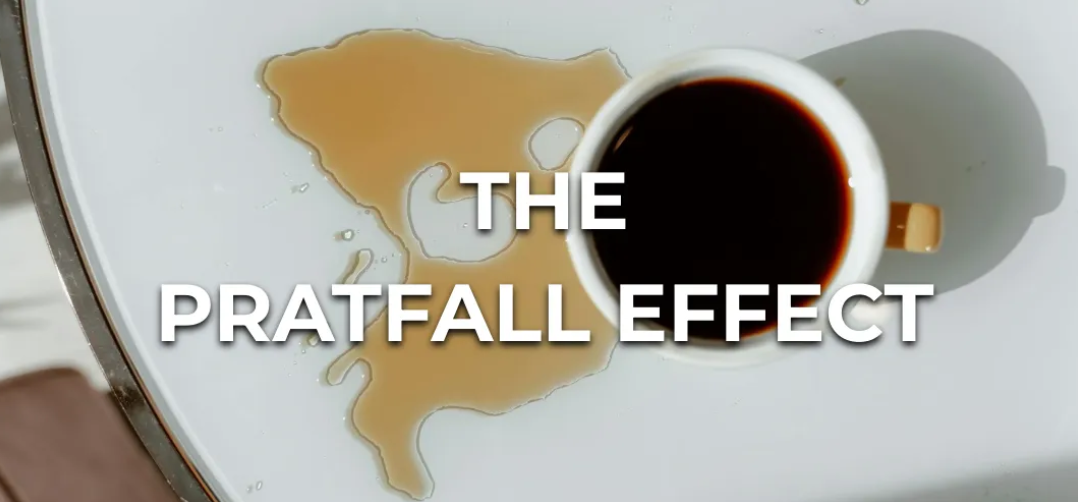Article
The Pratfall Effect

"To err is human" – we've all heard the saying. But what if those errors could actually boost your influence? Today, we're diving into the surprising psychology of the 'Pratfall Effect,' where a little stumble can make you more likable and persuasive.
The Science of Being Imperfectly Perfect
In a world of curated social media feeds and airbrushed images, a genuine misstep can be surprisingly refreshing. Think about it. Have you ever found yourself drawn to someone who's just a little bit clumsy, or who owns up to their mistakes with a self-deprecating chuckle? It's because we're wired to connect with authenticity, not perfection.
The original study by the American social psychologist Elliot Aronson found that audiences had a more favourable view of an expert that spilled coffee on themselves, even when others matched their test results.
Of course, there's a fine line. A major blunder by a newbie won't win any hearts; it'll just confirm their inexperience. An error in the core of your business or product won’t help either (sorry, CrowdStrike). But for those already established as competent, a small stumble can make them seem more approachable, more real.
The Self-Deprecating Leader
The boss who shares a lighthearted story about a past blunder isn't just getting a laugh – they're building trust. This vulnerability signals authenticity and shows they're not afraid to be human. Employees and stakeholders alike appreciate this honesty.
The "Perfectly Imperfect" Brand
Ever seen an ad that playfully pokes fun at a product's minor flaw? This disarming honesty cuts through the noise of polished marketing. It builds credibility because it shows the company isn't trying to pull the wool over your eyes.
The Expert Who Doesn't Know it All
Experts who admit they don't have all the answers come across as more credible, not less. It's a paradox, but it works. It shows they're transparent and still learning, qualities we admire. Don’t BS your way through a tough question. Admit you don’t know the answer but commit to following up.
This month, let's put the Pratfall Effect to the test. Here's your challenge:
-
Own Up to a Mini-Misstep: Think of a recent, minor mistake you made. Something relatable but not career damaging.. Maybe a recent presentation had a funny typo or you stumbled over a few sentences.
-
Share it (Strategically): Find the right moment to share your story. Maybe it's during a team meeting or in a casual conversation with a client. The key is to be genuine and vulnerable, not self-pitying.
-
Observe the Ripple Effect: See how people react. Chances are, your authenticity will resonate, making you more approachable and trustworthy.
The Pratfall Effect isn't about faking incompetence; it's about being real. It's about showing that even the most accomplished among us have moments of imperfection. By embracing those moments, you create a connection with your audience that goes beyond mere competence. You show them you're human, and that's a powerful foundation for building trust and influence.
Want to Learn More? Check out these great resources:
Psychology Today has a great overview of the Pratfall Effect here. For a deep dive on how companies have used the Pratfall Effect in marketing, check out this article from Einstein Marketer.
Authored By: Ben Wise (top) and Darren Chiu (bottom) are the founders of Captivate, providing tools and techniques to increase your powers of persuasion. They are sought after speakers on the psychology of persuasion and have appeared at industry events, conferences and corporate training programs. To book them for an engagement, please reach out via LinkedIn.
Ben Wise (top) and Darren Chiu (bottom) are the founders of Captivate, providing tools and techniques to increase your powers of persuasion. They are sought after speakers on the psychology of persuasion and have appeared at industry events, conferences and corporate training programs. To book them for an engagement, please reach out via LinkedIn.
Latest Resources
Recommended Resources
- The Difference Between Loyalty and Retention
- How to Negotiate with Different Personality Types
- Key Follow-Up Strategies to Keep your Prospect Engaged
- Must-Have Prospecting Tools for Every Sales Person
- 5 Ways You Can Benefit from Sales Training
- Using the 3x3x3 Method to Learn About Your Prospects
- Good Questioning Skills
- Sales Value Quantification

